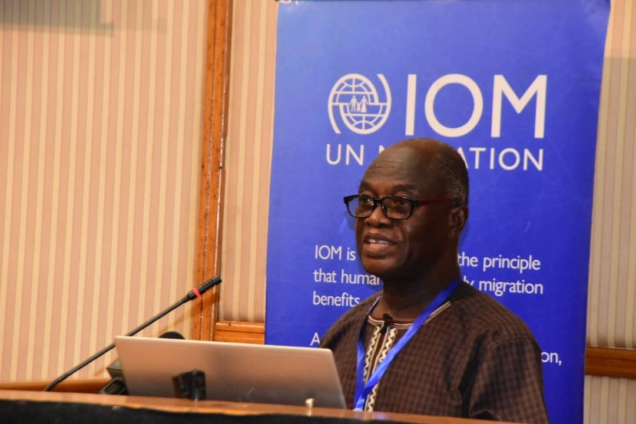
Audio By Carbonatix
About three in every four (76.2%) non-Ghanaians are working in three occupations only; namely, services and sales (34.0%), skilled agricultural, forestry and fishery (25.0%) and craft and related trades (17.2%).
According to the latest thematic report on Migration by the Ghana Statistical Service has revealed, these are easy-entry jobs which call for no skills or basic skills in order for one to go into them.
The majority of the working immigrants are self-employed without employees.
The highest proportion of non-Ghanaian population are from Nigeria, Togo, Niger and Burkina Faso
The migrants constituted 28.9% of the total population of 30,832,019 enumerated in the 2021 Population and Housing Census.
Majority (52.5%) of the migrants were females.
Speaking to Joy Business, Associate Professor of Population Studies at the Regional Institute for Population Studies at the University of Ghana, Professor John Anarfi said this is largely attributed to Ghanaians moving out of the country without skills in certain sectors.
He therefore entreated government to diversify the economy to have more Ghanaians acquire additional skills to accelerate the country’s economic growth.
“Ghanaians who are migrating are the main reason and those coming in are going to these areas. So as long as the situation continue, we will get people to occupy jobs which is not too good”, he said
The report further said the proportion of migrants in the population is much higher in rural areas (33.9%) than urban areas (22.2%).
More than a third (35.9%)of the migrants moved to settle permanently while 24.9% also moved due to marriage/family reunification.
Greater Accra received higher number of migrants
The Greater Accra Region received a higher number of migrants than all the other regions.
Six regions received more people than they sent out. All of them are in the south of the country.
The report furthered that there has been a slight decline in migration from 2010 – 2021. This may be as a result of the Covid-19 pandemic because most migrants had gone back to their hometowns and had not returned at the time the census was conducted.
There has been a decline in the non-Ghanaian population in the country between 2010 and 2021.
Latest Stories
-
GAF airlifts Baba Yara Stadium stampede victim to 37 Military Hospital
7 minutes -
Photos: Funeral rites for engineer Charles Amissah who died after alleged denial of emergency care
15 minutes -
Taking collagen keeps skin more elastic but won’t stop wrinkles, say scientists
15 minutes -
Principal of Nalerugu Nurses and Midwifery College suspended over unauthorised admissions
19 minutes -
Driver dies in trailer crash at Kordzeto in Hohoe
21 minutes -
India and Israel pledge to boost ties in defence and technology
25 minutes -
Livestream: Mahama delivers 2026 State of the Nation Address
26 minutes -
Nigerian artistes’ global success about individuals, not the country – Philkeyz
27 minutes -
Business end of European season
30 minutes -
55 Ghanaians killed in Russia–Ukraine war – Ablakwa
37 minutes -
Deloitte West Africa appoints Yomi Olugbenro as CEO-Elect
41 minutes -
Bawumia visits Ga Mantse, wishes him speedy recovery following accident
43 minutes -
Stanbic Bank Ghana leads US$205m financing for Engineers & Planners:
53 minutes -
Minister Jinapor highlights importance of accurate energy meters during GSA visit
59 minutes -
Nexans unveils anti-counterfeit cable to tackle fakes and improve fire safety
1 hour

